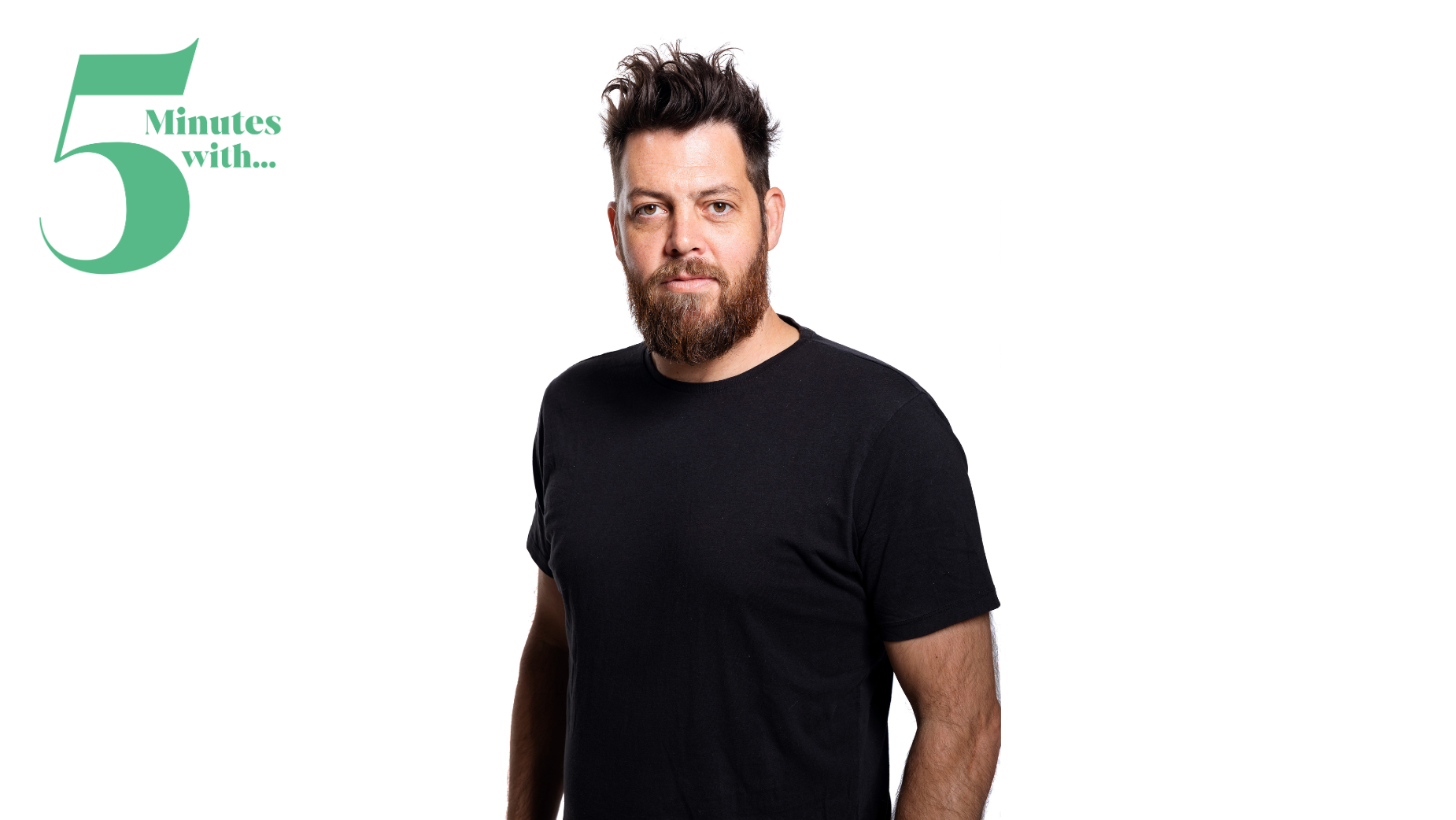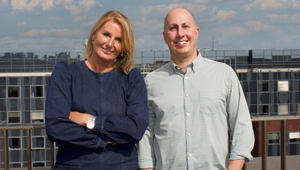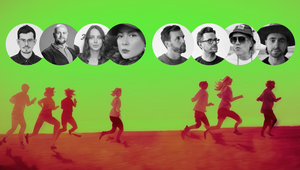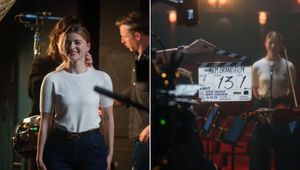
5 Minutes with... Ryan McManus

When VML announced the appointment of Ryan McManus as UK chief creative officer in May 2024, the agency network had only existed in its newly-merged form for a handful of months. Change was still in the air.
For Ryan, moving to the UK was a significant change, having most recently worked in New York and Detroit as VML’s chief creative officer for North America, where he led creative for one of WPP’s largest clients, Ford, as well as leading on Virgin Voyages, Miami Tourism and BIC. Before that he’d been CCO for VMLY&R in his home country of South Africa, so he’s at home in the network.
While he has an art director background, Ryan’s career has taken him in all sorts of directions beyond advertising and in all sorts of places beyond South Africa. In Amsterdam, he co-founded The Soon Institute – a company focused on prototyping the futures of brands. He then co-founded Join the Pipe, an NGO that won Best New Initiative from UNICEF. And he spent four months in Tuvalu directing a documentary about the climate crisis.
LBB’s Alex Reeves sat down to get to know Ryan and hear his vision for VML UK’s creative future.
LBB> How are you settling into life in London? How’s it feeling?
Ryan> It’s been pretty awesome. It was a crazy start – I came over from New York on a Sunday and was in the office by Tuesday. It’s been a whirlwind, soaking everything up and downloading all the information. But it’s amazing. The energy is great. There’s incredible talent in the building, and it’s about optimising, shaping that talent, and getting everything headed in the right direction.
The focus has been on organising, setting up frameworks, and creating a structure to get the best work out of people and deliver for clients. I’ve been spending time getting to know people, understanding strengths and weaknesses. It already feels like I’ve been here much longer. I’ve learned a lot and am now starting to sculpt things with all that information.
The vibe of the agency is one thing, but the vibe of London itself is super inspiring. In the summer, everyone was out and about – it had a great energy. People here are amazing. Everyone has a good sense of humour and can take a joke. The pubs are full of stories, culture, and people from all walks of life. It feels really good to be here.
LBB> You’ve been at VML for around seven years now, right? Obviously, there’ve been changes across different VML offices. How’s it been for you?
Ryan> My entry was a bit unusual because we sold our company, NATIVE, to VML. It was started by my amazing partner, mentor and friend, Jason Xenopoulos. It was a small company that grew and eventually became part of VML. I stayed on through the merger with VMLY&R and beyond. I’ve been on the global creative board for a long time, working closely with other offices and CCOs, so I feel very connected to the global leadership and the wider network. It’s a tight-knit group, which is great.
Coming from New York, the experience is different. New York is such a hub that when you work there, you naturally cover the rest of North America. Here in London, what I’m loving is having everyone under one roof. I can walk over to someone, get a team together, and work face-to-face instead of spending all day on Teams calls. I’ve done enough of that to last a lifetime. The dynamic changes when you’re in the same space – ideas become more tactile, and the energy feels different. It’s creating a nice vibe within the teams here. You can easily pull together a mix of people from commerce, strategy, tech, creative technology, or design and build hybrid teams. It’s a refreshing change.
LBB> Do you think the UK industry is open to that kind of collaborative approach, compared to New York?
Ryan> There are people who enjoy the flexibility of not coming into the office, but I think they miss out on a lot if they never come in. Different companies have different policies, but my focus is on creating a culture people want to be part of, rather than enforcing rules. Building teams and culture comes from spending time together, sharing ideas, and having conversations between meetings. If we create a strong creative community here, it’ll naturally attract people, rather than relying on policies or incentives like free drinks. I want to build a space where people are excited about the mission and want to be involved.
When I got here, I expected more resistance to a new person coming in, but I haven’t felt that at all. I had a similar expectation when I went to Detroit to run Ford for North America. At the airport, they had hoodies and shirts with the slogan “Detroit Vs. Everybody,” and I thought, “OK, here we go.” But Detroit turned out to be incredibly welcoming. London’s been the same. I thought I’d be coming in cold, with no one knowing me, but the reception has been great. There’s a strong energy, and you can feel it in conversations and the work going up on the walls. It’s starting to come together and find its mission.
LBB> How did you first get into “advertising” in the loosest sense?
Ryan> I didn’t really know what to do in school. My dad’s an architect, and he always had a love for conceptual ideas. I found out about this college called AAA in Cape Town, went there, and it opened up my whole world. I’d always loved design, art, film, and photography, but I’d never really thought about using them professionally. Suddenly, all the stuff I thought was cool outside of school became something I could actually do. It was awesome.
From there, I got hired straight out of my graduation exhibition into FCB in Cape Town. After that, I started jumping around the world. I’d go to a city, think, “This place is cool,” and see what I could do there. That’s how I worked for a long time – and I guess I’m still hopping around.
LBB> Was traveling and exploring a big intention for you?
Ryan> Definitely. I’ve always wanted to see as much of the world as possible. Living somewhere instead of just visiting on holiday is such a different experience. Coming from South Africa, you have to really mission to get anywhere – it’s far from most places. But if you learn how to hack travel, you can figure out how to get around. I ended up going all over, meeting amazing mentors, and working with incredible people. Along the way, I started companies and explored different corners of the creative industries. It’s been an awesome journey.
It’s really about trusting yourself to go somewhere and work it out. Through that, I’ve started companies, sold companies, worked as a film director and writer, done startups and NGOs – all with some creative angle. I don’t know if you’d call all of it advertising.
LBB> Many creative leaders in London agencies tend to follow a particular trajectory. Your journey seems quite different. Have you actively nurtured that breadth of experience?
Ryan> Yeah, I think I’ve always been a bit against getting too comfortable. Whenever things started to feel comfortable, it was time to go and learn something new. I’ve had some amazing chapters along the way and learned very different things from very different people, but I’ve always wanted to stay in a state of learning. I don’t ever want to become stagnant.
My dad turned 77 yesterday, and he’s still surfing every day. Last time we spoke, he told me he thinks he’s improved his pop-up on his right foot. I thought, that’s so cool – if you’re constantly learning, you’re constantly evolving. That’s always been my mindset. I’ve wanted to learn from great people in the industry and in adjacent sectors as well. Broadening your knowledge base – from business to clients to storytelling – makes you stronger.
LBB> What are some of the businesses or projects you worked on early in your career that really shaped your perspective?
Ryan> It’s hard to give you one example, so maybe I’ll give you a few learnings along the way. In the early years, I learned that an idea has the ability to take away any hierarchy, any barriers. The idea wins everything. That was a major unlock for me. Your currency, your everything, is the idea. It doesn’t matter who it comes from or where it comes from; you can get through any number of meetings or shareholder boardrooms if the idea is good enough. That realisation felt transcendent – like magic.
Later, I had an amazing mentor in Amsterdam, Lorenzo de Rita, who took me under his wing and showed me so much. Together, we started an NGO called Join the Pipe. It was about redistributing water in a fairer way in society. The idea came from frustration with a water company that wasn’t doing anything meaningful, so we stopped working with them and started our own initiative. It was my first time starting an NGO.
We designed reusable bottles shaped like pipe segments, which weren’t common at the time. For every bottle sold, we funded a real pipeline to bring water to people who needed it. We worked with partner NGOs to install water pipes in places like Congo, Angola, and India. I’ll never forget getting a call from Angola thanking us for putting in water pipes. They explained that young girls, who used to spend all day walking to fetch water, could now go to school. It was incredible to hear that.
This was before marketing started talking about purpose. I learned about purpose from the grassroots level, and it’s something I’ve carried through into a lot of my work. Not everything has to save the world, but I do think brands and corporations should be doing better. They can, and they should.
Everyone got fashionable saying, “I’m sick of purpose.” But what people were really sick of was the co-opting of purpose onto things that didn’t actually align with it. It became a bit of a disease.
Around that time, I went and lived on a South Pacific island called Tuvalu to make a documentary. I went there thinking it would be all about climate change refugees, because Tuvalu is the first nation under threat of being displaced due to rising sea levels.
LBB> Had you made a documentary before, or did you just dive in?
Ryan> I just dove in. I’d always loved documentaries and, in advertising, you get exposed to amazing directors. I was probably the irritating person constantly asking them questions – ‘What is this?’, ‘How does this work?’, ‘Why are you framing it like that?’ I tried to learn as much as I could and then started applying it.
This was just after DSLR cameras came out, so I figured out how to use them and thought, “We can do this.” It was an incredible experience – going to a remote island in the middle of nowhere, living there for four months (which felt like four years), and making something without any brands involved. It was a real test.
Around that time, we also had a company called The Soon Institute in Amsterdam, where we were prototyping ideas for the near future of brands. For example, if BMW makes concept cars, we’d ask, “What’s the concept car equivalent for Levi’s?” It was very experimental work, which taught me to be completely agnostic about channels.
We were coming up with product ideas, books, exhibitions, and branding. It wasn’t about specific channels; it was about putting people at the centre and building things around them. That was also when digital was really starting to rise.
It’s been about grabbing things from different places and shaping them. That history of experimenting across so many areas has made me comfortable flexing into any space now.
LBB> You spent the last two years in New York. What did you take from that experience?
Ryan> America’s got this insane scale. Organising creativity at that scale is something I really took from it – how do you structure it, how do you reprogram it? There are so many systems in place that feel immovable, but they’re all kind of made up. You have to deconstruct and reconstruct them to set teams up for success.
It was fascinating to work at that scale. Even with the work itself, some of the smaller side projects we put out had a huge impact. For example, for International Women’s Day, we did something for Ford – a ‘Men’s Only Edition’ car, where we removed all the things women had invented. The result? The car basically didn’t work. We made a quick video in the studio, put it on Ford’s social pages, and woke up the next morning to find it had gone viral globally. No media spend, just an idea that resonated.
That scale is amazing to play with. It makes you think about how to design work to catch fire like that. It’s the idea, but it’s also knowing what people are talking about and tapping into the zeitgeist – what people want to share in that context. Timing matters too. For example, we did something similar with Virgin Voyages and gen AI. Everyone was talking about gen AI, so we created Jennifer Lopez’s ‘Jen AI’. It was a joke, sure, but it worked and became part of the conversation. It was everywhere – even in The New York Times.
If you can join the conversation, that’s where it clicks. PJ Pereira said it years ago during his first social influencer judging speech at Cannes – social is like a party. When you show up to a party, you don’t pitch; you join the party.
It’s basic stuff, but the noise of advertising and buzzwords often complicate things. That makes it less fun for consumers and for the people making the work. If we don’t want to make boring, crappy pre-roll ads, why not make something people are searching for – something cool that they actually want to watch?
LBB> This might be tricky because it’s asking you to big yourself up, but when you joined, Pip Hulbert (VML’s UK chief executive officer) said you don’t fit the mould. What do you think she meant by that?
Ryan> I’m not sure. Maybe there are more traditional approaches out there – like specialists in the industry who write amazing film scripts. I love doing that too, but I also like finding new ways to talk about things. We have so many tools and diverse points of view available to us, and I don’t think the answer is always the same.
I think sometimes in this industry we fall into the “when you’re a hammer, every problem is a nail” mindset. We end up creating within a narrow framework instead of exploring completely new sectors. That’s not to say we can’t make a great film – I love doing that, but we shouldn’t ignore the wider possibilities for creativity. I don’t know exactly what Pip meant, though.
What we provide to clients, more than anything else, is perspective. Otherwise, they’d just do it all in-house. Having a healthy dose of perspective from the street, from people’s point of view, is really important.
LBB> You’ve alluded to surfing before – you’re a big surfer? And I hear you like to spend time barefoot?
Ryan> Yeah, I’m from Africa. I grew up barefoot. They had to force us to wear shoes to go to school. I spent my childhood running around forests, rivers, and being a wild kid – it was amazing.
Even now, when I’m barefoot, it’s usually when I’m happiest and most connected to everything. It’s often when I’m on a surf trip, with family, or in nature. Nature is a far bigger inspiration to me than a boardroom or a computer.
I don’t want to get too hippy about it, but there’s a consciousness of ideas and connectivity if we tap into it. And it’s not just on the internet – it’s out there in the world around us. Staying connected to that is important.
Sandy Thompson, who used to be the CSO of Y&R in New York, had a great way of putting it. She said, “If you’re a strategist and you want to learn about a lion, you don’t go to the zoo – you go to the jungle.” Technically, it’s the savannah, not the jungle, but the sentiment is right. It’s about getting out into the real world.
That’s why, on one hand, I talk about getting people back to the office and spending time together, but I don’t think we should be sitting at desks staring at screens all day either. It’s about hanging out, exploring ideas, and staying connected to reality – the real reality, not the digital matrix.















